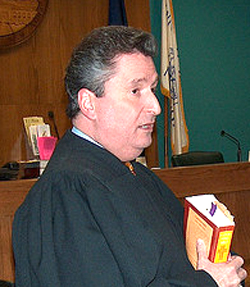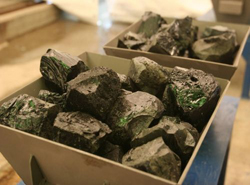Lewiston Road in the hands of the judge
By Darryl McPherson
 |
| State Supreme Court Justice Frank Caruso will weigh arguments on Lewiston Road. |
 |
| Radioactive slag buried under the
road, once removed, may not be stored in New York State. was trucked to Michigan. |
State Supreme Court Justice Frank Caruso has a big decision to make Wednesday, Sept. 26. On that day, he will hear the arguments of David Pfeiffer and his construction company Man O’ Trees, and those of the City of Niagara Falls.
Pfeiffer will be arguing in favor of an injunction to prevent the city from awarding a new construction contract to continue the work on the Route 104 Lewiston Road project. The city will argue in favor of allowing the long-delayed work to resume under a new contractor.
Pfeiffer wants to finish the job. He wants to be paid for the work he has done, and receive assurances that a proper radiation remediation protocol will be established to protect his employees and the residents of Lewiston Road. He is also looking to protect the reputation of his company.
His original complaint alleges that the city and its officials have damaged him and Man O’ Trees by making defamatory remarks in public forums. Awarding the contract to another company would cement that conclusion and a decision in his favor would give him the chance to prove them wrong.
The city sees the imbroglio as a breach of contract issue. They filed a lawsuit in early August, and believe the case to be heard Wednesday is in retaliation for that suit. In their view, Man O’ Trees abandoned the job, leaving the unfinished streetscape for residents to live with these past few years.
It will be up to Caruso to look beyond the motives of the parties and bring justice to this equation.
What decision will be in the best interests of the people?
In order for an action seeking injunctive relief to be successful, there are three or four prongs that must be satisfied. (1) There must be a likelihood of success on the merits by the party bringing the action. (2) There must be the likelihood of irreparable harm to the party bringing the action if injunctive relief is not granted. (3) The court must consider the balancing of the equities between the parties. This requires the court to weigh such factors as public policy and the convenience or hardship to the parties in order to determine what is fair. (4) Sometimes, the court will also consider whether the public interest is not disserved by granting or denying the injunction.
If Man O’ Trees can successfully satisfy these factors, the scales tip in its favor. If it cannot, the city will walk away victorious.
The only thing that is certain is that this is only the first step in the process. Wednesday’s hearing will likely only decide the merits of granting or denying a permanent injunction. The other elements of the case, including any decision on damages, will come at a later date.